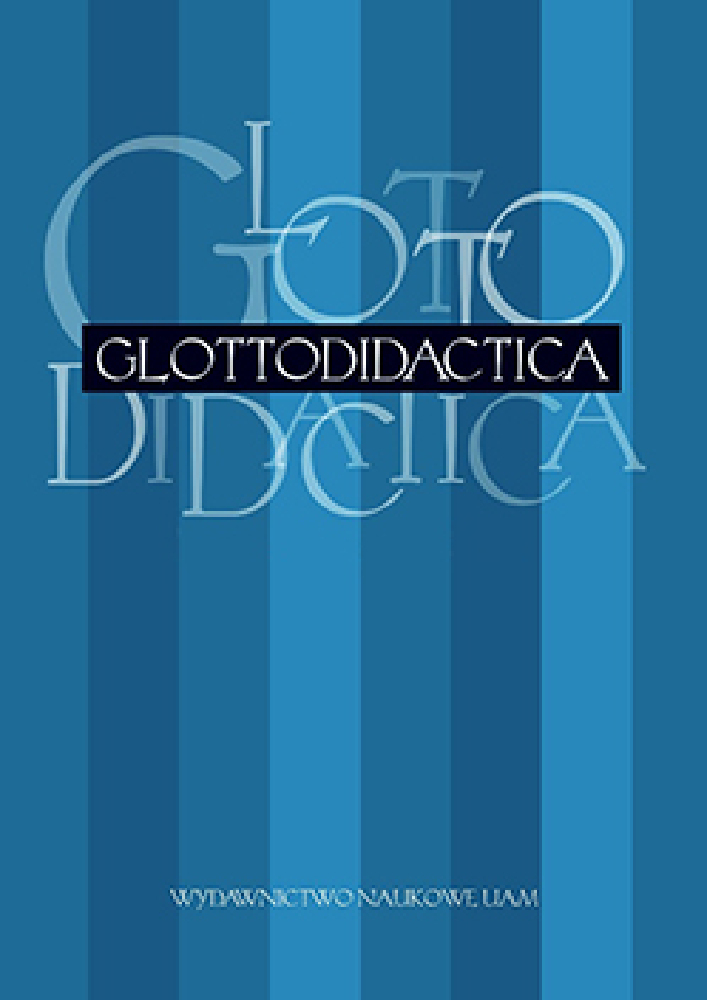Résumé
The paper deals with the problem of balance maintenance of natural languages in the context of foreign language teaching. A new paradigm of foreign language teaching in the following triad: native language – global language – second foreign language is proposed. Translingualism is treated as the only means of maintaining linguistic balance between natural languages viewed from an ecolinguistic perspective.Références
Baker, C., 2001. Review of Tove Skutnabb-Kangas „Linguistic Genocide”. In: Journal of Sociolinguistics 52, 279–283.
Duff, P., N. Hornberger (eds). 2008. “Encyclopedia of Language and Education”. Language Socialization. New York: Springer Science and Media LLC.
Fill, A., 1998. Ecolinguistics – State of Art 1998. In: Arbeiten aus Anglistik und Amerikanistik 1, 1–16.
Fill, A, 2001. Language and Ecology: Ecolinguistic Perspectives for 2000 and Beyond. In: Applied Linguistics for the 21st Century: AILA Review 14, 60–75.
Fill, A., P. Mühlhauser (eds), 2001. The Ecolinguistic Reader. Language, Ecology and Environment. London: Continuum.
Fishman, J, W. Conrad, A. Rubal-Lopez (eds), 1996. Post-Imperial English. Status Change in former British/American colonies, 1940–1990. Berlin–New York: Mouton de Gruyter.
Hajer, M., 1995. The Politics of Environmental Discourse: Ecological Modernization and the Policy Process. Oxford: Claredon Press.
Halliday, M., 2001. New ways of Meaning: Challenge to Applied Linguistics. In: A. Fill and P. Muhlhausler (eds): The Ecolinguistic Reader: Language, Ecology and Environment: London: Continuum Press. 175–186.
Haugen, E., 1971, The Ecology of Language. The Linguistic Reporter. Supplement 5, 19–26.
Haugen, E., 1972. The Ecology of Language. Essays by Einar Haugen. London: Stanford University Press.
Jacobs, G., A. Goalty. 2000. The Treatment of Ecological Issues in Coursebooks. In: ELT Journal 54, 256–264.
Jung, M., 2001. Ecological criticism of language. In: The Ecolinguistic Reader. Language, Ecology and Environment 68, 4–10.
Mufwene, S., 2001. The Ecology of Language Evolution. Cambridge University Press.
Mühlhausler, P., 1996. Linguistic Ecology. Language Change and Linguistic Imperialism In the Pacific Region. London: Routledge.
Mühlhausler, P., 2003. Language of Environment – Environment of Language. A Course in Ecolinguistics. New York: Battlebridge.
Mühlhausler, P., 2005. Language Planning and Language Ecology. In: Current Issues in Language Planning 1, 347–255.
Pennycook, A., 1994. The Cultural Politics of English as an International Language. London: Longman.
Phillipson, R., T. Skutnabb-Kangas, 1996. English Only Worldwide or Language Ecology. In: TESOL QUARTERLY 30 (3), 429–452.
Puppel, S., J. Puppel, 2005. Zagadnienie percepcji języka naturalnego w triadzie: język ojczysty – język globalny – język sąsiedni na przykładzie triady: język polski – język angielski – język niemiecki w ujęciu ekolingwistycznym: próba typologii. In: Scripta Neophilologica Posnaniensia VII, 55–96.
Puppel, S., 2007a. Interlingwalizm czy translingwalizm? Interkomunikacja czy transkomunikacja? Uwagi w kontekście współistnienia języków naturalnych w ramach globalnej wspólnoty kulturowo-językowo-komunikacyjnej. In: Scripta de Communicatione Posnaniensi, Seria: Prace Naukowe Katedry Ekokomunikacji UAM I, 27–43.
Puppel, S., 2007b. Tężyzna języków naturalnych. In: Halina Chałacińska-Wiertelak / K. Kropaczewski (eds.), Dyskurs wielokulturowy. Poznań: Wydawnictwo Naukowe UAM, 15–25.
Puppel, S., 2007c. Ochrona języków naturalnych. In: Scripta de Communicatione Posnaniensi. Seria: Materiały Dydaktyczne Katedry Ekokomunikacji I, 221–230.
Ruiz, R., 1984. Orientations in language planning. In: National Association for Bilingual Association (NABE) 8 (2), 15–34.
Shultz, B., 2001. Language and the Natural Environment. In: Fill, A. and Mühlhausler, P. (eds) The Ecolinguistics Reader. London: Continuum, 109–114.
Skunabb-Kangas, T., 2000. Linguistic Genocide in Education – or Worldwide Diversity and Human Rights? New York: Lawrence Earlbaum Associates.
Trim, J., 1959. Historical, Descriptive and Dynamic Linguistics. In: Language and Speech 2 (1), 9–25.
UNESCO, 2003. Language Vitality and Endangerment. In: UNESCO Intangible Cultural Heritage Unit’s Ad Hoc Expert Group on Endangered Languages. Approved 31 March 2003 by the Participants of the International Expert Meeting on UNESCO Programme Safeguarding of Endangered Languages 1, 10–12.
Wendel, J., 2005. Notes on the Ecology of Language. In: Bunkyo Gakuin University Academic Journal 5, 511–516.
Widdowson, H., 1999. Coming to Terms with Reality: Applied Linguistics in Perspective. In: 12th Congress of Applied Linguistics, AILA 99, 69–76.
Wilson, G., 1999. Environmental Education in Taiwan: The Mountain Program. In: Global Issues in Language Education Network Newsletter 1, 12–13.
http://portal.unesco.org./culture/en/ev.php=URL_ID=8270&URL_DO=DO_TOPIC&URL_SECTION=201.html.
Martin, P.W., Creese, A., Bhaat, A. and Bhojani, N., 2004 Final Report on Complementary S. Schools and their Communities in Leicester. Leicester University/University of Birmingham. http://le.ac.uk./education/research/complementary schools/index.html
Pitts, M., J.F. Nussbaum, 2006. „Integrating the Past and Paving the Future. Examining the Current Trends and Extending the Boundaries of Language and Social Psycho Research. Journal of Language and Social Psychology. Vol. 25, N 3, 197–202, Sage (http://oneline.sagepub.com).
UNESCO, 2003. “Recommendations for Action Plan”. International Expert Meeting on UNESCO Programme Safeguarding of Endangered Languages, UNESCO, Paris
Fontenoy, 10–12 March 2003. (http://portal.unesco.org/culture/en/ev.php.URL_ID11992& URL_DO=DO_TOPIC&URL_SECTION=201.html).
Licence
Auteurs
Les auteurs de textes acceptés pour publication dans la revue Glottodidactica sont tenus de remplir, signer et renvoyer à l'adresse de la rédaction, un accord sur l'octroi d'une licence gratuite pour les œuvres, avec obligation d'accorder une sous-licence CC.
Conformément à cet accord, les auteurs des textes publiés dans la revue Glottodidactica accordent à l'Université Adam Mickiewicz de Poznań une licence non exclusive et gratuite et autorisent l'utilisation de la sous-licence Creative Commons Attribution-NoDerivatives 4.0 International (CC BY-ND 4.0).
Les auteurs se réservent le droit de disposer librement de l'œuvre.
Utilisateurs
Les utilisateurs d'Internet intéressés ont le droit d'utiliser les œuvres publiées dans la revue Glottodidactica depuis 2016, selon les conditions suivantes :
- Attribution – obligation de fournir, conjointement avec l'œuvre distribuée, des informations sur l'auteur, le titre, la source (lien vers l'œuvre originale, DOI) et la licence elle-même.
- Aucune modification – l'œuvre doit être préservée dans sa forme originale. Sans le consentement de l'auteur, il n'est pas possible de distribuer l'œuvre modifiée sous forme de traductions, publications, etc.
Les droits d'auteur sont réservés pour tous les textes publiés avant 2016.
Autres
L'Université Adam Mickiewicz de Poznań conserve les droits sur la revue dans son ensemble (mise en page, forme graphique, titre, conception de la couverture, logo, etc.).
A PARTIR DE L’ANNEE 2015, LES ARTICLES PUBLIÉS DANS LA REVUE SONT DISPONIBLES SOUS LICENCE CREATIVE COMMONS : https://creativecommons.org/licenses/by-nd/4.0/deed.fr




